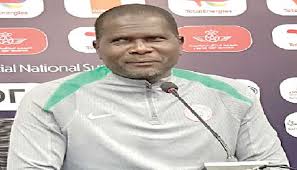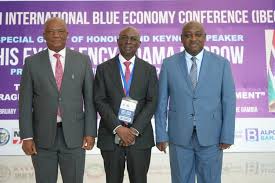Business
LCCI Urges FG To Reduce Inflation Through Improved Petrol Export
The Lagos Chamber of Commerce and Industry (LCCI) has called on the Federal Government to boost crude oil refining and petrol export to meet its inflation reduction target and also strengthen the naira.
Speaking to The Tide’s source, President of the LCCI, Gabriel Idahosa, said the 2025 budget of N54.99trillion is insufficient to achieve Nigeria’s broad economic growth targets, including achieving a $1trillion economy by 2030 and reducing inflation to 15 per cent from a record high of 34.8 per cent.
“None of the budget either this year or next year will be enough to achieve the broad targets of growing the economy. This budget is just one of several steps towards that ultimate objective”, Idahosa said.
He stressed that while the government’s inflation reduction target of 15 per cent is ambitious, it can be met with disciplined policies, particularly in the foreign exchange market.
“Some of the targets have been considered ambitious, like the inflation reduction of inflation targets. A lot of observers feel that it is quite ambitious and it will be difficult to attain.
“The government has given itself a very challenging target on inflation reduction. So, we will see how they can achieve it. Everyone is hoping that they can achieve it”, he said.
He encouraged the government to focus on stabilising the foreign exchange to N1,300, noting, “If they can reduce the stable exchange rate from N1,500 to about N1,400 or N1,300 as the sustainable new exchange rate benchmark, then you can see inflation coming down even more than their targets”.
Idahosa emphasised that Nigeria must ramp up local refining and exportation of petroleum products to stabilise the exchange rate and reduce inflation.
“It is very important that we are producing enough and exporting. The more we export refined petroleum products, the lower the exchange rate; typically, the price of the dollar will be coming down”, he said.
According to the LCCI President, a surplus of foreign currency will emerge as Nigeria produces more refined products, alongside an increase in non-oil exports like fertilisers and cement.
He highlighted the role of the Dangote Refinery and NNPC refineries in eliminating petrol imports and turning Nigeria into a net exporter of refined petroleum products.
“We have the Dangote Refinery and NNPC refineries, to give enough for us to completely stop import of petrol. Generally, the surplus of extra foreign currency in the economy is increasing as we produce more refined products and non-oil exports.
“We are already exporting, but we must ensure we stop importing petrol completely”, he stated.
Idahosa projected that inflation will decline throughout the year due to reduced transportation costs, driven by the expansion of Compressed Natural Gas and Liquefied Petroleum Gas vehicles and metro rail projects in Lagos, Abuja, and other cities.
“The metro lines and the gas are very crucial to significantly reduce transportation costs, and that will reduce inflation”, he said.
He also expressed optimism about Nigeria’s economic outlook, saying that a stronger Naira would be achieved as exports expand and the country shifts from being a consumption-based economy to a production-based one.
“We are now recognised worldwide as a producing country for refined petroleum products. The outlook is certainly positive”, he concluded.
Business
$5bn Train 7 Project 80% Complete -NCDMB
The Board stated this in a statement released by its Corporate Communications Directorate to newsmen, recently, during the inauguration of 140 trainees for the Train 7 Project.
The trainees had undergone the Nigerian Content Human Capacity Development (NC-HCD) programme it organised in partnership with the Nigeria Liquefied Natural Gas (NLNG) Limited in Port Harcourt, the Rivers State capital.
The Tide gathered that the training programme was an intensive three-month Advanced NC-HCD Programme for the US$5 billion NLNG Train 7 Project on Bonny Island, Rivers State.
The trainees, The Tide further learnt are graduates in different academic disciplines who have completed a 12-month Basic Training Programme in diverse oil-and-gas-industry-related skill sets and are now set for an on-the-job phase which includes active hands-on participation in operational areas such as Turn Around Maintenance (TAM), Commissioning, and Desktop Programmes.
The Corporate Communications Directorate of the NCDMB told The Tide that in November 2024, a set of 331 trainees under Batch A of the NLNG T7 HCD Training Programme began capacity development in facility management, engineering, Information and Communication Technology (ICT), Health Safety and Environment (HSE), Quality Assurance and Quality Control, as well as welding and fabrication.
According to the Board, additional 77 trainees under Batch B of the same Training Programme began capacity development in data analytics and supply chain management among several other fields relevant to the operations of the oil and gas industry.
While addressing the trainees and trainers who were drawn from the Oil and Gas Trainers Association of Nigeria (OGTAN), Management Personnel of the NCDMB and NLNG, the Executive Secretary of NCDMB, Engr Felix Omatsola Ogbe, said the Advanced NC-HCD training is more than a milestone.
“The NC-HCD training programme is an expression of the collective commitment of the Board and the NLNG to nurturing world-class Nigerian professionals who will shape the future of our oil and gas industry.
“The Board has remained steadfast in its conviction that Human Capital Development is a critical investment in the sustainability and competitiveness of Nigeria’s oil and gas value chain”, the NCDMB boss said.
Business
Ageing Aviation Workforce: Minister Urges Youth Grooming For Replacement
He said the situation has resulted in widened knowledge gaps and operational challenges.
As a globally regulated sector, he said it was important that stakeholders put measures in place to attract the talents required to move the industry forward.
Keyamo, therefore, called on stakeholders in the industry to be deliberate in identifying, encouraging, nurturing and harvesting young talents to ensure a sustainable supply of manpower to the aviation sector.
Director of Public Affairs and Consumer Protection of the FAAN, Mrs Obiageli Orah, in a release made available to aviation correspondents, noted that the Minister deemed it necessary to attract the right quality of human resources required to move the sector forward.
“As a globally regulated sector, it is important that stakeholders put measures in place to continually attract the right quality and quantity of human resources required to move the industry forward.
“It is important to note that organising training programmes are avenues through which we can breed, nurture, and harvest such human resources.
“One of the critical challenges facing the industry is the ageing and retiring workforce, leading to widened knowledge gaps and operational issues.
“Training programmes, I believe, is among other things designed to make aviation appealing to the younger generation, while encouraging them to develop interest in taking up a career in the industry”, the statement stated.
Meanwhile, some aviation stakeholders have expressed concerns of countless young Nigerians who seek to make their mark in aviation, tourism, and the wider transport ecosystem but often face steep barriers to entry.
According to them, lack of access, limited mentorship, financial constraints, skill mismatches, and systemic gaps, among others, have posed some constraints to them.
Business
Ogbe Gets Appo Board Appointment
The Tide gathered that by the appointment, Ogbe becomes Nigeria’s representative on the Board of the 18-member continental body, which has its headquarters at Brazzaville, Republic of the Congo.
Ogbe was picked for this role by the Minister of State for Petroleum Resources (Oil), Senator Heineken Lokpobiri, who doubles as the Chairman of the NCDMB Governing Council.
The notice of the Executive Secretary’s appointment was conveyed in a congratulatory letter signed by the Director of Support Services, APPO, Mrs. Philomena Ikoko, on behalf of the Secretary-General of the organisation, Dr. Omar Farouk Ibrahim.
She applauded the NCDMB boss on the confidence reposed in him by the Minister, expressing her belief that he would make immense contributions to the development of the African oil and gas industry.
Mrs Ikoko stated that Ogbe was joining the Executive Board of APPO at a challenging time for the oil and gas industry, especially in Africa.
“Your appointment is a major call to duty for Nigeria and the continent. The secretariat will give you the support you will need to make a success of your assignment”, she said.
According to a statement by the Directorate of Corporate Communications and Zonal Coordination, the NCDMB played key roles in catalysing the operations of APPO and the development of local content in Africa.
The statement added that the board was providing institutional support and mentorship to several oil producing countries in their formulation of local content policies.
“The NCDMB initiated the African Local Content Roundtable (ALCR) and hosted the inaugural edition in Yenagoa, Bayelsa state, in June 2021, and the event was attended by key officials of APPO and other oil industry players.
“The idea for the Africa Energy Bank (AEB) was mooted by NCDMB’s officials at the event, as one of the strategies that would accelerate the growth of the African oil and gas industry and deepen local content.
“The Board also collaborated with APPO to host subsequent editions of the African Local Content Roundtable (ALCR), including the 2023 edition held at Abuja.
“The Africa Energy Bank, which APPO is setting up at Abuja, is aimed at pooling financial resources needed to fund big-ticket oil and gas projects across the continent, and bridge funding challenges currently impeding the development of the sector”, the NCDMB’S said.
Meanwhile, the APPO Secretary-General has said the Africa Energy Bank seeks to fund oil and gas projects across economies in Africa and help to plug critical financing gaps that exist through the continent’s over reliance on financiers from the West.
He added that each APPO member country is expected to raise $83 million with an objective of raising $5 billion capital for the establishment of the Bank.
The Tide learnt that recently Nigeria, Angola and Ghana have contributed their share capital for the African Energy Bank, which represents 44 percent of the trio’s contributions to the minimum capital that is required from oil producing countries in the continent.
It would be recalled that at the Nigerian Oil and Gas Opportunity Fair (NOGOF) held recently, the NCDMB’s Scribe confirmed that the agency was part of key institutions that pooled resources for the formation of the Africa Energy Bank.
Ogbe announced that the Bank will open for business before the end of the 2nd quarter of this year, 2025, expressing hope that it will create more funding availability for local oil and gas projects and companies.
Similarly, the Minister of State for Petroleum Resources (Oil), Senator Heineken Lokpobiri, had stated at the Offshore Technology Conference that Afrexim Bank has already raised $19billion for the take-off of the Africa Energy Bank.
According to him, $14 billion out of the funds represents the bank’s financial exposure on African oil and gas projects, with the additional $5 billion as take-off capital.
-

 News5 days ago
News5 days agoWorld Bank predicts decline in global economic growth
-

 Sports5 days ago
Sports5 days agoFlying Eagles Coach To Address Team’s Deficiencies
-

 News5 days ago
News5 days agoArmy Trains 604 Special Forces To Boost National Security
-

 Sports5 days ago
Sports5 days agoUnity Cup Games Performance Excites NFF President
-

 News5 days ago
News5 days agoNigeria seeks collaboration for ocean protection
-

 Sports5 days ago
Sports5 days agoUS Based Athletes To Lead Nigeria In Fencing Championships
-

 News5 days ago
News5 days agoEx-president Buhari donates cow, rice to corps members in Daura
-

 Sports5 days ago
Sports5 days agoIkpeba Football Challenge Final Holds,’Morrow

